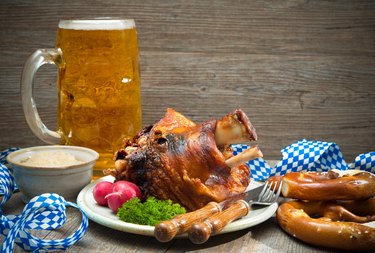
Smoked ham hocks consist of 2 to 3 inch chunks of the lower part of a pig's back legs and often include not just the meat, but bone, fat and other tissues. Smoked ham hocks impart a rich, smoky flavor to dishes that require long cooking periods such as beans and stews. Smoked ham hocks cooked with collard greens is a typical Southern dish. If you don't have smoked ham hocks, you can use salt pork, smoked turkey drumsticks or cubed ham as an alternative.
Calories
Video of the Day
A 4-oz. serving of smoked ham hocks contains 300 calories. Ham hocks are generally not eaten alone, however, so be sure to account for all the calories in your recipe for your eating plan.
Video of the Day
Fat
Most of the calories in a 4-oz. smoked ham hock serving come from fat – 72 percent of the calories. Each serving contains 24 g of fat, a significant portion of the 44 to 78 g of fat, or 20 to 35 percent of your recommended daily calories, based on a 2,000-calorie diet. Consuming too much fat regularly can result in weight gain and obesity. Seven grams of the fat in a serving of smoked ham hocks are saturated fat -- the "bad" type of fat -- although research published in the October 2010 issue of the medical journal "Lipids" notes that eating saturated fats alone is not enough to cause medical problems such as coronary heart disease. Rather, other risk factors, including genetics and lifestyle, in conjunction with your intake of saturated fat dictate how your body reacts to this type of fat.
Protein and Carbohydrates
Smoked ham hocks are a good source of protein, providing 17 g per serving. Protein serves a secondary source of fuel for your body and it also plays other critical roles in keeping your body functioning well. The protein present in ham hocks greases your immune system, so to speak, allowing it to operate at optimal levels. It also promotes the production of muscle. You'll also get 5 g of carbohydrates, which serve s you body's main source of energy, in a serving of smoked ham hocks.
Considerations
While several bacteria and parasites are associated with undercooked pork, including mold, trichinosis and staph bacteria, you are unlikely to encounter this in smoked ham hocks as this food is commonly very thoroughly cooked to kill these contaminants. Do not eat smoked ham hocks unless it is completely cooked. In addition, smoked ham hocks do contain enough sodium to warrant monitoring your diet plan for intake; a 4-oz. serving has 115 mg, or 7.6 percent of the recommended daily amount of 1,500 mg.